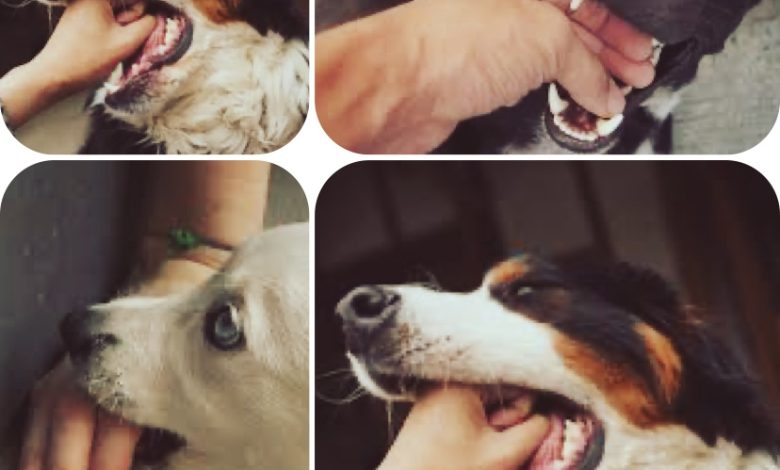Why Do Dogs Mouth?

If you’re a dog owner, chances are you’ve experienced your pup using their mouth to interact with you or objects around the house.
This behavior is called mouthing and is a natural part of a dog’s development. In this article, we’ll explore what mouthing is, why dogs do it, and how you can manage the behavior.
What is Mouthing in Dogs?
Mouthing is when a dog uses their mouth to interact with people or objects. This can range from gentle nibbling to more forceful biting. Puppies often mouth as a way to explore their environment and learn about different textures and tastes.
As they grow older, most dogs will stop mouthing as frequently, but it can still be a part of their behavior in certain situations.
So, the next time your puppy starts mouthing your hand or furniture, don’t worry too much. It’s simply their way of exploring the world around them! However, it’s important to keep mouthing under control so it doesn’t become a problem.
Is Mouthing the Same as Biting?
It’s easy to get confused between mouthing and biting, but they’re actually quite different. Biting is a more aggressive and intentional behavior that can cause harm. Mouthing, on the other hand, is often a playful or exploratory behavior that doesn’t result in injury.
If your dog is mouthing, you might feel a little uncomfortable at first, but it’s important to remember that mouthing is a natural behavior.
In fact, it’s a way for dogs to communicate and interact with their environment. So, while mouthing might not always be appropriate, it’s not necessarily a bad thing.
Also Read: Can dogs eat dog meat?
Why Do Dogs Mouth?
Dogs mouths for many different reasons. As mentioned, puppies may mouth as a way to explore their surroundings. Adult dogs may also mouth as a way to play, communicate, or show affection. However, some dogs may mouth excessively, which can become a problem.
If your dog is mouthing excessively, it’s important to understand why they’re doing it. Are they bored? Do they have pent-up energy? Do they need more stimulation? Once you identify the root cause, you can take steps to manage the behavior.
Also Read: How to Stop Your Pup from Nipping
When Does Mouthing Become a Problem?
Mouthing can become a problem if it’s excessive, aggressive, or causes harm. For example, a puppy that constantly mouths can be annoying to people and may lead to destructive chewing behavior. An adult dog that mouths too hard or too often can cause injury or fear in people.
If your dog’s mouthing behavior becomes a problem, don’t panic. With proper training and redirection, you can manage the behavior and prevent any negative consequences.
How to Train Your Dog Not to Mouth
Training your dog not to mouth requires patience and consistency. The first step is to teach your dog basic commands like “sit” and “stay.”
This will establish a foundation of obedience that you can build on. From there, you can use positive reinforcement to encourage good behavior and redirect mouthing when it occurs.
For example, if your dog starts mouthing your hand, say “no” firmly and offer them a chew toy instead. When they start mouthing the toy instead of your hand, give them praise and a treat. By consistently reinforcing positive behavior, you can train your dog not to mouth.
Also Read: How do Dogs Act When they are Close to Death
Tips for Redirecting Mouthing Behavior
If your dog is mouthing too much, there are a few things you can do to redirect their behavior. One option is to offer them a chew toy or other object to the mouth instead.
You can also use verbal cues like “no” or “ouch” to let them know when they’re mouthing too hard. Be sure to offer praise and treats when they respond appropriately to these cues.
Another helpful tip is to give your dog plenty of exercise and mental stimulation. Boredom and pent-up energy can often lead to excessive mouthing behavior.
So, make sure your dog is getting enough physical activity and mental enrichment through activities like puzzle toys, obedience training, and walks.
When to Seek Professional Help
In some cases, mouthing behavior can become a serious issue that requires professional help. If your dog’s mouthing is aggressive or causes harm, it’s important to seek the assistance of a professional dog trainer or behaviorist.
They can help identify the underlying cause of the behavior and provide guidance on how to manage it effectively.
Is Dog Mouthing a Sign of Affection?
Yes, dog-mouthing can be a sign of affection. When dogs mouth in a gentle and playful way, it can be a way of showing affection and bonding with their owners. Puppies, in particular, often use their mouths to explore and interact with their environment, which can include mouthing their owners.
Why Does My Dog Mouth My Hand When I Pet Him?
When your dog mouths your hand while you’re petting them, it’s likely a sign of excitement or playfulness. Dogs often use their mouths to interact with objects and people around them, and petting can be a stimulating and exciting experience for them.
However, if your dog’s mouthing is too hard or becomes aggressive, it’s important to redirect the behavior to prevent injury.
Why Does My Dog Gently Mouth My Hand?
Gentle mouthing is often a sign of affection or playfulness in dogs. When dogs mouth gently, it’s a way of interacting with their owners and showing affection.
This behavior is more common in puppies, but adult dogs can also exhibit gentle-mouthing behavior as a way of bonding with their owners.
Dog Mouthing Each Other
Dogs also use mouthing behavior to interact with each other. When dogs play, they may use their mouths to nip or gently bite each other as part of their play.
While this behavior can look aggressive, it’s often just a form of communication and playfulness between dogs. However, it’s important to monitor play behavior to ensure it doesn’t become too rough or escalate into more aggressive behavior.
What to Do with a Dog that Bites their Owner
If your dog bites you or someone else, it’s important to take immediate action to prevent injury and address the underlying cause of the behavior. First, seek medical attention if necessary.
Then, identify the trigger for the behavior and address it through training, management, and behavior modification techniques. It’s also a good idea to seek the help of a professional dog trainer or behaviorist to ensure the safety of both you and your dog.
Conclusion
Mouthing is a common behavior in dogs that can be managed with proper training and redirection. By understanding why dogs mouth and how to differentiate between playful and aggressive behavior, you can create a safe and positive environment for both you and your furry friend.
Remember to be patient, consistent, and always use positive reinforcement to encourage good behavior. With these tips and a little bit of effort, you can help your dog develop good mouthing habits and enjoy a happy and healthy life together.





